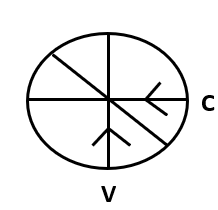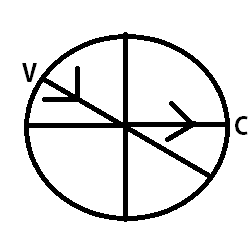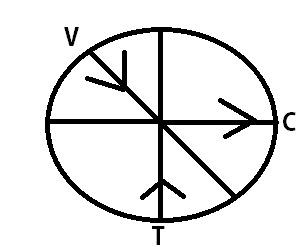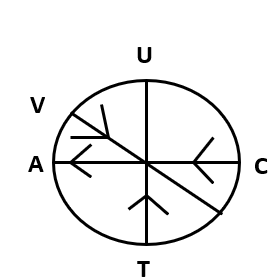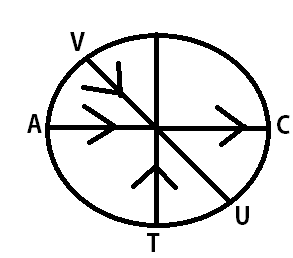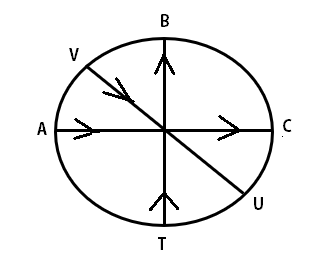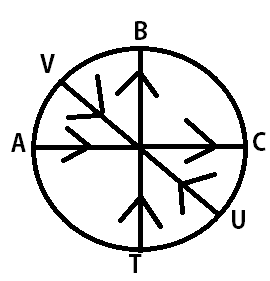Circular Arrangement Facing Centre and Outside





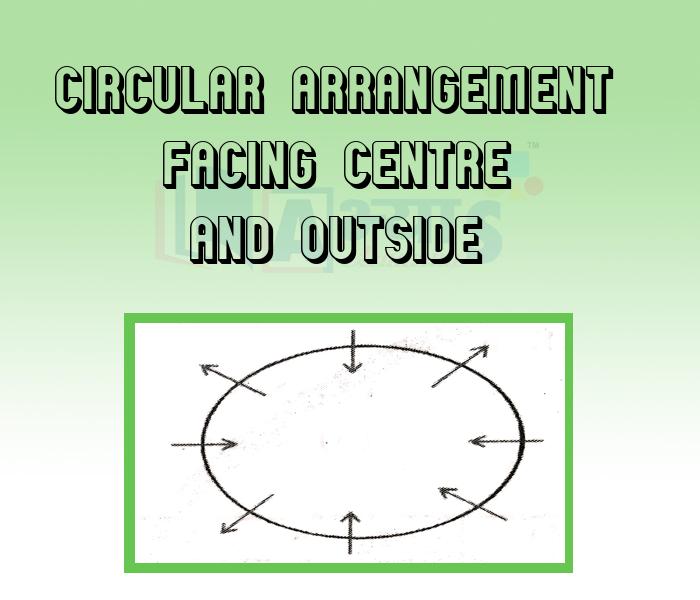
Circular Arrangement Facing Centre and Outside
Seating Arrangement: These type of questions are the most common type in most of the competitive examinations where are reasoning of the candidate is to be analysed. These concepts involve the arrangement of objects/ people in various ways. Generally one problem is followed by five to six questions so it is always advantageous to attempt the seating arrangement questions in the examination, because by solving one problem we are fetching more marks than by solving other single questions.
Circular Arrangement Facing Centre And Outside: In facing away from the center that is outside, left means anti-clockwise while right means clockwise direction. In circular arrangement facing towards the centre means right means anti-clockwise Direction and left means clockwise Direction. As both the concepts are to be applied to the same question, we will draw a diagram depicting the position of the objects or people. When the question arises where both type of sitting is provided, we will follow the rulers of both the directions and draw as many alternatives as available Later, according to the conditions provided the alternatives will get eliminated & only I valid diagram will remain. We will then analyse the position of the various objects or the people and will then answer the questions.
Illustration: Study the following information to answer the given questions :
V, U, T are seated in a circle facing to the centre. A, B, C, are also seated in same circle but two of them are not facing centre (opposite of the centre). V is second to the left of C. U is second to the right of A. B is third to the left of T. C is second to the right of T. A is next to V..
What is position of A with respect to B ?
A. 2nd to the left B. 3rd to the right C. 2nd to the right D. 3rd to the left
Answer: A
Solution: When the question arises where both type of sitting is provided, we will follow the rulers of both the directions and draw as many alternatives as available Later, according to the conditions provided the alternatives will get eliminated & only I valid diagram will remain.
Given : - V, U, T - Facing centre A, B, C, - direction unknown
(a) Since C's direction is not known, it can face inward / outward. So we will form 2 possibilities.
Fig. I |
Fig. II |
(b) Also it is given then C is second to the right of T. So the Fig I gets eliminated as T can't be placed there.After placing T the Fig. II figure will be as shown in Fig. III
Fig. III |
(c) Now it is given U is second to right of A. Two possibilities.
Fig. IV |
Fig. V |
(d) B is third to right of T. So B cannot be placed in Fig. IV. Hence Fig IV is eliminated and after placing B the Fig. V figure will be as shown in Fig. VI. Moreover only two are facing outwards so U will face inwards. Hence the final diagram will be Fig. VII
Fig VI |
Fig. VII |
From the diagram it is clear that counting from B in anticlockwise direct, A is second to the left of B.Hence A is the correct option.
Study the following information carefully and answer the given question. How many persons are there between P and Q? | |||
| Right Option : C | |||
| View Explanation | |||
Directions: Study the following information carefully and answer the given questions.
Eight persons – Barkha, Rajdeep, Arnab, Kashyap, Menon, Razdan, Mehta and Ravish - are sitting around a circle at equal distance between two persons but not necessarily in the same order. Some of them are facing towards the centre while some others are facing outside the centre. Ravish is sitting 3rd to the left of Mehta. Both Mehta and Ravish are facing towards the outside. Kashyap is not an immediate neighbour of Mehta or Ravish. Razdan faces the just opposite direction of Kashyap. (It implies that if Kashyap is facing towards the centre, Razdan would face outside the centre). Razdan is sitting 2nd to the left of Kashyap. Both the immediate neighbours of Arnab face just opposite direction of Arnab. Barkha is an immediate neighbour of Mehta. Both the immediate neighbour of Kashyap face just opposite direction of Kashyap. Barkha faces towards the centre and she is an immediate neighbour of both Mehta and Menon. Menon faces towards the centre. Who among the following are not facing towards the centre?
| |||
| Right Option : C | |||
| View Explanation | |||
Directions: Study the following information carefully and answer the questions given below:
Eight workers I, J, K, L, M, N, P and Q are sitting around a circular table but not necessarily in the same order. Some of them are facing outward. They are working at four stalls, viz Cloth, Food, Footwear and Books, in a trade fair. Two persons are working at each stall. Note: Facing the same means if one face the centre then the other person also faces the centre and if one person faces outward then the other person also faces outward. Facing opposite directions means if one person faces the centre then the other person faces outward and vice versa.
Who among the following are not facing towards the centre? | |||
| Right Option : A | |||
| View Explanation | |||
Students / Parents Reviews [10]
My experience with Abhyas is very good. I have learnt many things here like vedic maths and reasoning also. Teachers here first take our doubts and then there are assignments to verify our weak points.

Shivam Rana
7thAbout Abhyas metholodology the teachers are very nice and hardworking toward students.The Centre Head Mrs Anu Sethi is also a brilliant teacher.Abhyas has taught me how to overcome problems and has always taken my doubts and suppoeted me.

Shreya Shrivastava
8thIt has a great methodology. Students here can get analysis to their test quickly.We can learn easily through PPTs and the testing methods are good. We know that where we have to practice

Barkha Arora
10thIt was good as the experience because as we had come here we had been improved in a such envirnment created here.Extra is taught which is beneficial for future.

Eshan Arora
8thBeing a parent, I saw my daughter improvement in her studies by seeing a good result in all day to day compititive exam TMO, NSO, IEO etc and as well as studies. I have got a fruitful result from my daughter.

Prisha Gupta
8thA marvelous experience with Abhyas. I am glad to share that my ward has achieved more than enough at the Ambala ABHYAS centre. Years have passed on and more and more he has gained. May the centre flourish and develop day by day by the grace of God.

Archit Segal
7thMy experience with Abhyas academy is very good. I did not think that my every subject coming here will be so strong. The main thing is that the online tests had made me learn here more things.

Hiya Gupta
8thIt was a good experience with Abhyas Academy. I even faced problems in starting but slowly and steadily overcomed. Especially reasoning classes helped me a lot.

Cheshta
10thAbhyas Methodology is very good. It is based on according to student and each child manages accordingly to its properly. Methodology has improved the abilities of students to shine them in future.

Manish Kumar
10thMy experience was very good with Abhyas academy. I am studying here from 6th class and I am satisfied by its results in my life. I improved a lot here ahead of school syllabus.

